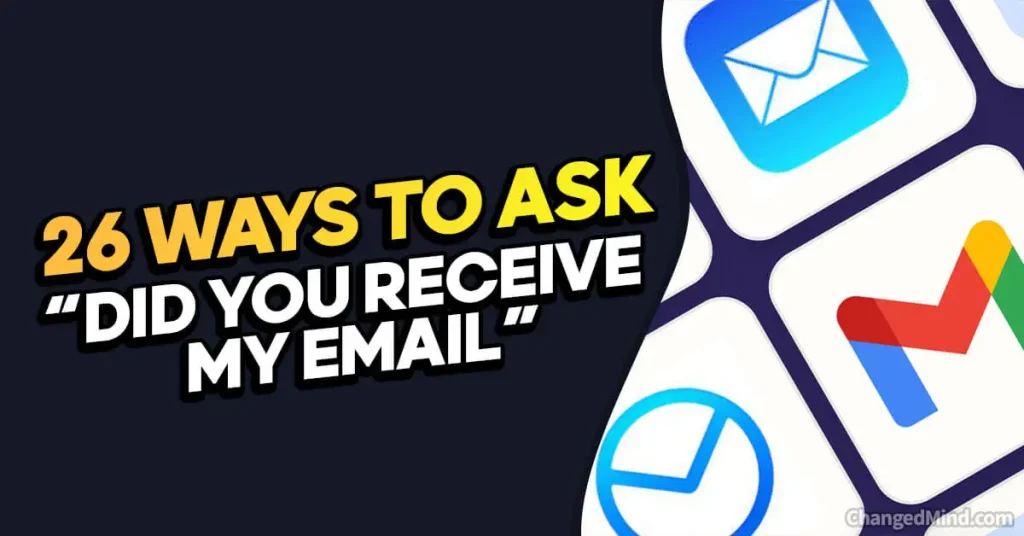Tired of the endless “Did you get my email?” echo chamber? Brace yourselves, because we’re about to sprinkle some charm, wit, and even a dash of whimsy into your digital correspondence game.
In this article, we’ve curated 26 delightful alternatives to the ever-bland “Did You Receive My Email.”
From the subtly assertive to the playfully curious, we’ve got the magic words to transform your email inquiries.
Get ready to add pizzazz to your inbox and ensure your messages get the attention they deserve.
We’ll be exploring:
- Clever email check-ins.
- Polite and professional options.
- Injecting a touch of humor.
- Crafting curiosity-driven queries.
- Boosting response rates.
- And much more! Stay with us, and let’s redefine your email etiquette!
Using alternative phrases to ask “Did you receive my email?” can be beneficial in various situations and avoid the limitations of using the same phrase repeatedly.
It is essential to consider the appropriateness of different phrases based on the context and the relationship with the recipient.
Here are several alternative phrases to inquire about email receipt:
- “Can you confirm if you’ve received my email?”: This polite and direct question seeks a confirmation without sounding too pushy.
- “I just wanted to check if my email reached you”: This phrase conveys a friendly tone and shows genuine concern.
- “Could you please let me know if you’ve got my email?”: By using “please” and requesting a response, this phrase emphasizes politeness and clarity.
- “I hope my email hasn’t gotten lost in transit”: This statement expresses a concern without directly asking for confirmation.
- “Did my email make it to your inbox?”: This question is concise and straightforward, seeking a simple response.
- “Could you confirm receipt of my email?”: This phrase is clear and professional, ensuring that the recipient acknowledges receiving the email.
When choosing an alternative phrase, consider the level of formality and professionalism required in the situation. Assess the relationship with the recipient and adjust the tone accordingly. Furthermore, the urgency and importance of the email should guide the choice of phrase.

By using these alternative phrases, you can effectively inquire about the receipt of your email while maintaining courtesy and professionalism.
Key takeaway:
- Using alternative phrases to ask about email receipt can improve communication: Asking the same question in different ways helps avoid repetition and maintains engagement in email conversations.
- Adapting your language based on the situation and relationship is crucial: Different situations call for different phrases to inquire about email receipt, considering factors such as formality, relationship with the recipient, and the email’s urgency or importance.
- Choosing the right alternative phrase enhances professionalism: Considering the level of formality and professionalism required in a particular situation is important when selecting alternative phrases to ask if an email has been received.
26 Other Ways to Ask “Did You Receive My Email”
Here are 26 other ways to ask “Did You Receive My Email”:
- Did my message land in your inbox?
- Is my email in your hands?
- Can you confirm email receipt?
- Did my note reach you?
- Did my email make it through?
- Has my message arrived safely?
- Did my correspondence find you?
- Has my email popped into your inbox?
- Is my email in your possession?
- Has my message been delivered?
- Can you verify email receipt?
- Did my note get to you?
- Did you get my email alright?
- Has my email reached its destination?
- Did my correspondence reach you?
- Did my email successfully send?
- Has my message been received?
- Can you acknowledge email receipt?
- Is my email in your mailbox?
- Did my note land in your inbox?
- Has my email safely arrived?
- Did my message hit your inbox?
- Did my email come through?
- Has my correspondence found you?
- Did my email reach its target?
- Can you confirm my email’s delivery?
26 Polite Ways to Ask “Did You Receive My Email”
Here are 26 polite ways to ask “Did You Receive My Email”:
- I hope my email has reached you.
- May I confirm if my message got through?
- I was wondering if you received my email.
- Could you kindly verify email receipt?
- I’d appreciate knowing if my note arrived.
- Is it possible to confirm my email delivery?
- I’m inquiring about the status of my message.
- Would you mind confirming email receipt?
- I’m checking to ensure my email reached you.
- Could you please acknowledge my email?
- Your confirmation of email receipt would be great.
- I’m hoping my message landed in your inbox.
- May I inquire if my email was successfully sent?
- I’d be grateful if you could confirm my email.
- I’m reaching out to check on my email’s delivery.
- Could you kindly let me know if my message came through?
- Would it be possible to verify if my email arrived?
- I’m interested in knowing if my note reached you.
- Your confirmation of my email’s arrival would help.
- I’m kindly requesting confirmation of my email.
- May I politely ask if my message got to you?
- I’d appreciate knowing if my email was received.
- Could you please confirm if my note was delivered?
- I’m checking to ensure my email reached your inbox.
- Would it be possible for you to confirm email receipt?
- I’m reaching out to inquire about my email’s status.
26 Professional Ways to Ask “Did You Receive My Email”
Here are 26 professional ways to ask “Did You Receive My Email”:
- I am writing to confirm the delivery of my email.
- May I request confirmation of email receipt?
- I would appreciate it if you could acknowledge my email.
- Could you kindly verify if my message reached you?
- I am inquiring about the status of my email.
- I am writing to ensure that my email was successfully sent.
- Please confirm the delivery of my email at your earliest convenience.
- I would like to confirm that my message was received.
- May I inquire if my email reached its destination?
- Could you provide confirmation of my email’s delivery?
- I am reaching out to ascertain the receipt of my email.
- Your confirmation of email receipt would be highly valued.
- I kindly request verification of my email’s delivery.
- May I respectfully inquire if my email reached your inbox?
- I am interested in confirming the successful delivery of my email.
- Could you please confirm the receipt of my message?
- I am writing to verify the status of my email.
- Please acknowledge the receipt of my email.
- I would appreciate knowing if my message was received.
- Could you provide confirmation that my email was delivered?
- I am inquiring about the receipt of my email.
- May I kindly request confirmation of my email’s arrival?
- I am writing to confirm that my email reached you.
- Please confirm the successful delivery of my message.
- I would be grateful for your confirmation of email receipt.
- May I ask for confirmation that my email was received?
Why Use Alternative Phrases to Ask “Did You Receive My Email?”
Why should you utilize alternative phrases to inquire about the receipt of your email? There are several advantageous reasons for doing so.
By using different language, you can avoid sounding repetitive, improve the clarity of your message, and maintain a professional tone.
Below, you will find key reasons why using alternative phrases is beneficial:
1. Preventing Repetition: Instead of continuously asking, “Did you receive my email?” you can employ alternative phrases to convey the same message. This will prevent your communication from sounding monotonous and enhance its overall flow.
2. Adding Clarity: Utilizing different phrases can provide additional context or information about your email. This makes it easier for the recipient to understand the purpose or urgency of your message. For instance, you could ask, “May I confirm whether you have received the attached document?” This clearly specifies the content of your email and the specific request.
3. Demonstrating Professionalism: Incorporating alternative phrases showcases your professionalism and adaptability in communication. It demonstrates that you are not limited to one particular way of seeking confirmation and are open to different approaches.
4. Enhancing Engagement: By using a variety of phrases, you can avoid potential miscommunication or misinterpretation. This can lead to better engagement and ensure that your email receives the attention it deserves. For example, you might inquire, “I wanted to check if my previous email reached you successfully. Is there anything you would like to discuss further?”
5. Tailoring to Recipients: Individuals have varying preferences and communication styles. By utilizing alternative phrases, you can cater to the preferences of your recipients, increasing the likelihood of receiving a prompt response or acknowledgement.
6. Maintaining Professionalism: Alternative phrases allow you to maintain a professional tone while still seeking confirmation. For instance, you could say, “I would appreciate it if you could confirm the receipt of my email at your earliest convenience.” This maintains a polite and respectful tone, even when requesting confirmation.
Incorporating alternative phrases when asking, “Did you receive my email?” offers numerous advantages. It helps avoid repetition, adds clarity, showcases professionalism, enhances engagement, tailors to recipients, and maintains a professional tone. By implementing alternative phrases in your communication, you can improve the effectiveness of your email interactions.
What Are the Limitations of Using the Same Phrase?
What are the limitations of using the same phrase to ask if someone has received your email?
When using the same phrase to ask if someone has received your email, it’s essential to be aware of the following limitations:
- Lack of clarity: By repeatedly using the same phrase, such as “Did you receive my email?”, the recipient may not fully understand the purpose or urgency of your communication. Incorporating different phrases can provide additional context and clarity.
- Boredom and disinterest: Asking the same question repeatedly can result in boredom or disinterest from the recipient. They may overlook or dismiss your email if it appears repetitive or unengaging.
- Ineffective communication: Different circumstances require different phrases to effectively convey your intentions. For instance, if your email contains critical information or necessitates a response, utilizing alternative phrases can make your request more prominent and increase the likelihood of receiving attention.
- Lack of personalization: Repeatedly using the same phrase can make your communication feel impersonal. By exploring alternative phrases, you can demonstrate a greater level of consideration and thoughtfulness towards the recipient.
- Unresponsiveness: If you consistently receive lackluster responses or no response at all when using the same phrase, it may indicate that the phrase is ineffective in eliciting the desired response. Trying different phrases can help overcome this limitation and enhance communication.
- Perception of urgency: Certain phrases, like “I hope my email hasn’t gotten lost in transit” or “Could you confirm receipt of my email?”, can convey a sense of urgency or importance. Repeatedly using the same phrase may give the impression that your email is not a priority, leading to delays in response or action.
To overcome these limitations, it is crucial to consider alternatives when inquiring about email receipt. By varying your language, considering formality and professionalism, and taking into account the relationship with the recipient, you can enhance the effectiveness and impact of your communication. The urgency and importance of the email should also be reflected in the chosen alternative phrase.
By being mindful of these limitations and making appropriate adjustments, you can improve your ability to communicate effectively and receive timely responses to your emails.
Why Do Different Situations Call for Different Phrases?
Alternative Phrases to Ask About Email Receipt
When you send an important email, you may find yourself wondering whether the recipient received and read it. Instead of using the same old phrase “Did you receive my email?” there are a variety of alternative phrases to ask about email receipt.
Here are some options:
- Can you confirm if you received my email? – This straightforward question asks the recipient for confirmation of receipt without being too pushy.
- I wanted to make sure my email reached you. – By expressing your intention to ensure delivery, you convey your concern without sounding demanding.
- Just checking to see if my email made it to your inbox. – This friendly inquiry shows that you’re simply double-checking without any pressure.
- Could you please confirm receipt of my email? – Adding the polite word “please” makes your request more courteous and respectful.
- May I know if my email reached you successfully? – This polite question seeks acknowledgement while maintaining a professional tone.
- Have you had the chance to review the email I sent? – By phrasing it as a question about the recipient’s availability, you give them the option to respond when they are ready.
- Would you mind letting me know if you received my email? – This gentle request seeks confirmation while respecting the recipient’s time and willingness to respond.
Remember to adjust your tone and wording based on your relationship with the recipient and the urgency of the email. It’s important to be respectful and considerate, while still conveying your desire for confirmation.
By using alternative phrases to ask about email receipt, you can maintain professionalism and enhance communication with the recipient.
1. “Can You Confirm if You’ve Received My Email?”
When attempting to determine if someone has received your email, it is advantageous to utilize alternative phrases that convey the same message but offer diversity in your communication.
By doing so, you evade the restrictions of using the same phrase repeatedly and accommodate various scenarios.
Here are a few alternative phrases you can employ to inquire if someone has received your email:
1. “Can you confirm if you’ve received my email?” – This straightforward query enables a clear response about the email’s receipt status.
2. “I just wanted to check if my email reached you.” – This statement communicates a casual tone while still seeking confirmation.
3. “Could you please let me know if you’ve got my email?” – By using “please” and “got” instead of “received,” you maintain politeness while expressing your inquiry.
4. “I hope my email hasn’t gotten lost in transit.” – This slightly more concerned statement implies that you are worried about the email’s delivery and prompts the recipient to offer reassurance.
5. “Did my email make it to your inbox?” – This direct question seeks confirmation regarding the successful delivery of the email.
6. “Could you confirm receipt of my email?” – By using “receipt” instead of “received,” this phrase emphasizes that you are specifically seeking acknowledgment of the email’s reception.
When selecting an alternative phrase, take the following factors into consideration:
1. Formality and professionalism: Assess the level of formality and professionalism required for your email communication and choose a phrase that aligns with those expectations.
2. Relationship with the recipient: Consider your relationship with the recipient and determine the appropriate tone and level of familiarity to use in your alternative phrase.
3. Urgency and importance of the email: Tailor your chosen phrase based on the urgency and importance of the email. For crucial matters, a more assertive phrase may be appropriate, while for less pressing matters, a more casual approach can be suitable.
Utilizing alternative phrases to inquire if someone has received your email can help avoid repetitive communication and provide clarity. By considering factors such as formality, relationship with the recipient, and the urgency of the email, you can select the most effective alternative phrase for your specific situation.
2. “I Just Wanted to Check if My Email Reached You”
When seeking confirmation that your email has been received, it is beneficial to use alternative phrases instead of asking the same question repeatedly.
The limitations of using the same phrase include the potential for it to be overlooked or ignored, resulting in uncertainty about whether your message has reached the recipient.
Different situations call for different phrases based on factors like formality, relationship with the recipient, and urgency.
One alternative phrase that can be used is, “I simply wanted to confirm if my email reached you.” This statement implies a proactive approach, conveying your desire for confirmation without appearing too assertive. It maintains a direct and concise tone while expressing your concern.
To ensure a professional approach, it is important to consider the formality of your relationship with the recipient. If you have a formal relationship, a suitable alternative phrase could be, “Can you please verify if you have received my email?“
This phrase conveys professionalism and respects the recipient’s position while still requesting the necessary information.
Another option is, “Could you kindly inform me whether you have received my email?” This phrase combines politeness with a clear request for confirmation. It highlights your expectation of a response and encourages the recipient to provide the desired information.
In situations where you are concerned about your email potentially getting lost in transit, the phrase “I sincerely hope my email has not been lost in transit” can be used to express your concern without sounding accusatory. It conveys a genuine worry and significantly increases the chances of receiving a response.
If you want to inquire about the successful delivery of the email, you can ask, “Has my email arrived in your inbox?” This straightforward question seeks confirmation without using any modal verbs, maintaining a factual tone.
For a more formal approach, you can use the phrase, “Could you please confirm receipt of my email?” This wording displays professionalism and expectation for confirmation, making it suitable for official or formal interactions.
When choosing an alternative phrase, consider aspects like the formality and professionalism of your relationship with the recipient, as well as the urgency and importance of the email. The chosen phrase should align with these considerations to ensure it is appropriate and effective.
By using alternative phrases to ask whether your email has been received, you can increase your chances of receiving a prompt response. Remember to tailor your approach based on the specific circumstances and maintain a professional tone throughout your communication.
3. “Could You Please Let Me Know if You’ve Got My Email?”
When you want to inquire about whether someone has received your email, using different phrases can be more effective than repeatedly asking, “Did you receive my email?”
Here are some alternative phrases you can use:
1. “Can you confirm if you’ve received my email?” – This phrase seeks confirmation directly from the recipient, ensuring that they have indeed received your email.
2. “I just wanted to check if my email reached you.” – This phrase conveys a friendly and casual tone while still expressing your concern about the email’s delivery.
3. “Could you please let me know if you’ve got my email?” – This polite request asks the recipient to inform you about the status of your email and shows respect for their time.
4. “I hope my email hasn’t gotten lost in transit.” – This phrase expresses a concern that your email may have encountered delivery issues and establishes a desire for confirmation.
5. “Did my email make it to your inbox?” – This straightforward question aims to confirm whether your email successfully reached the recipient’s inbox.
6. “Could you confirm receipt of my email?” – This phrase seeks a formal confirmation of email receipt and acknowledges the recipient’s responsibility in acknowledging your message.
When choosing an alternative phrase, consider factors such as formality and professionalism, your relationship with the recipient, and the urgency and importance of the email. Adapt your choice based on the context to ensure clarity and maintain a respectful tone.
By utilizing these alternative phrases, you can avoid sounding repetitive while effectively checking if your email has been received. Remember to choose the most appropriate phrase based on the situation and maintain clear communication with your recipient.
4. “I Hope My Email Hasn’t Gotten Lost in Transit”
When sending an important email, it can be nerve-wracking to wonder if it has been received by the intended recipient.
Instead of using the same phrase repeatedly, it’s essential to consider using alternative phrases to ask about email receipt.
One such alternative is saying, “I hope my email hasn’t gotten lost in transit.” This phrase conveys concern without sounding overly pushy or demanding.
By using this alternative phrase, you subtly express your desire for confirmation of email receipt while acknowledging the possibility of technical issues or other challenges that may have prevented the email from reaching its destination.
It also shows that you understand the challenges of modern communication and are willing to give the recipient the benefit of the doubt.
When choosing this alternative phrase, there are a few considerations to keep in mind. First, consider the formality and professionalism of your relationship with the recipient.
If you have a close or informal relationship, a more casual and light-hearted phrase may be appropriate.
If it’s a professional setting or a new contact, it’s best to maintain a more formal tone.
Another factor to consider is the urgency and importance of the email. If it’s a time-sensitive matter or if the email contains critical information, a more direct and urgent phrase may be appropriate.
If it’s a general inquiry or non-urgent matter, a phrase like “I hope my email hasn’t gotten lost in transit” strikes the right balance of concern and patience.
When asking about email receipt, considering alternative phrases is essential to maintain effective communication. By using the phrase “I hope my email hasn’t gotten lost in transit,” you convey your concern while showing understanding and patience.
Adjusting your language based on the formality of your relationship and the urgency of the email ensures your message is received appropriately. Remember, patience and understanding go a long way in maintaining positive communication channels.
Pro-tip: If you still haven’t received a response after a reasonable amount of time, consider sending a follow-up email politely requesting confirmation as a gentle reminder to the recipient.
5. “Did My Email Make It to Your Inbox?”
When it comes to inquiring about the delivery of your email, using a variety of phrases can be beneficial for avoiding repetition and enhancing the clarity of your message.
Here are several alternative phrases you can utilize:
- “Can you confirm if you’ve received my email?”
- “I just wanted to check if my email reached you.”
- “Could you please let me know if you’ve got my email?”
- “I hope my email hasn’t gotten lost in transit.”
- “Did my email make it to your inbox?”
- “Could you confirm receipt of my email?”
When choosing which alternative phrase to use, take into consideration the following factors:
- Formality and professionalism: The appropriate phrase to use depends on the level of formality and professionalism required in your email. For more formal situations, it is advisable to use phrases such as “Can you confirm if you’ve received my email?” whereas in more casual situations, phrases like “I just wanted to check if my email reached you” may be more suitable.
- Relationship with the recipient: Consider your relationship with the recipient. If you share a close and friendly relationship, using phrases like “Could you please let me know if you’ve got my email?” can be more appropriate. If the recipient is a colleague or someone with whom you have a professional relationship, a more formal phrase like “Can you confirm if you’ve received my email?” may be preferable.
- Urgency and importance of the email: Depending on the urgency and importance of your email, you may choose different phrases to convey the same message. For instance, if your email is time-sensitive, using phrases like “I hope my email hasn’t gotten lost in transit” or “Did my email make it to your inbox?” can emphasize the urgency and significance of the situation.
By incorporating alternative phrases to inquire about the delivery of your email, you can prevent repetition and enhance communication clarity.
Take into account the context, relationship, and urgency of the email to select the most appropriate phrase for your specific situation.
6. “Could You Confirm Receipt of My Email?”
- Consider establishing the context: Before directly asking for confirmation of email receipt, it’s important to set the tone and purpose of the email. This can be done by providing a brief introduction or mentioning the specific topic discussed in the email.
- Use polite language: When asking someone to confirm the receipt of your email, it’s essential to maintain a polite and professional tone. Using phrases like “Could you please” or “I would appreciate” can help convey courtesy and respect.
- Be clear and concise: Ensure that your request for confirmation is straightforward and easy to understand. Avoid using complex language or unnecessary details that could confuse the recipient.
- Offer alternatives: Instead of simply asking for confirmation, provide the recipient with additional options to respond. For example, you can ask them to reply directly to the email or suggest scheduling a call to discuss the content further.
- Consider urgency: If the email contains time-sensitive information or requires immediate attention, make it clear in your request for confirmation. Expressing the urgency can prompt a quicker response.
- Proofread your email: Before sending the email, carefully review the content to ensure there are no grammatical or spelling errors. A well-written and error-free email reflects professionalism and attention to detail.
History of email:
Email has become an integral part of modern communication, revolutionizing the way we interact and share information.
The first email was sent in 1971 by Ray Tomlinson, who is often credited with inventing the modern email system. It was a simple message sent between two computers, marking the beginning of a new era in communication technology.
Since then, email has evolved and transformed the way we conduct business, connect with friends and family, and exchange information across the globe. With the advancement of technology, email platforms and features have improved significantly, allowing for faster and more efficient communication.
Today, billions of emails are sent and received daily, making it one of the most widely used forms of digital communication.
With its convenience, speed, and versatility, email continues to play a vital role in our personal and professional lives.
So the next time you send an email and want to confirm its receipt, remember to follow these steps to effectively communicate your request.
“Could You Confirm Receipt of My Email?”
Considerations When Choosing an Alternative Phrase
When it comes to finding the right words to ask if your email has been received, there are key considerations to keep in mind.
We’ll explore these considerations in this section: from the level of formality and professionalism you want to convey, to the strength of your relationship with the recipient, and the sense of urgency and importance surrounding your email.
Let’s dive in and discover the best alternative phrases that suit your unique communication needs!
1. Formality and Professionalism
When selecting alternative phrases to inquire about email receipt, it is crucial to take into account the level of formality and professionalism required for the given situation.
Utilizing suitable language can assist in maintaining a respectful and professional tone in your communication. Here are some factors to consider:
- Tone: The level of formality and professionalism in your email should align with the nature of your relationship with the recipient and the context of your communication. If you have a close and informal relationship, you may employ a more relaxed tone. In professional or formal settings, it is vital to uphold a formal tone.
- Greetings and Closings: The greetings and closings you employ in your email can contribute to the overall formality or professionalism. Simple greetings like “Hi” or “Hello” are generally acceptable in most situations. For more formal emails, you might consider using “Dear [Recipient’s Name]”.
- Language Choice: The language you use in your email should reflect the level of professionalism required. Avoid using slang, abbreviations, or informal language. Instead, choose clear and concise language that is appropriate for the given context.
- Punctuation and Grammar: Maintaining proper punctuation and grammar is critical in preserving a professional tone. Take the time to proofread your email for any errors or typos that may diminish the level of professionalism.
- Addressing the Recipient: Use appropriate titles and names when addressing the recipient. If you are uncertain about the recipient’s preferred title, it is best to opt for a more formal option such as “Mr.”, “Ms.”, or “Dr.”
- Keep it Polite: Irrespective of the level of formality, always ensure that your email is polite and respectful. Incorporate phrases like “please” and “thank you” to demonstrate your appreciation and sustain a positive tone.
When selecting alternative phrases to inquire about email receipt, take these factors into consideration. Modifying your language to match the appropriate level of formality and professionalism can aid in effective communication across various professional and personal contexts.
2. Relationship with the Recipient
- When considering the nature of your relationship with the recipient, it is crucial to choose an alternative phrase that aligns with the level of formality. If you have a formal relationship, such as being a boss or a client, it is essential to maintain professionalism. For instance, you can ask, “Can you please confirm if you have received my email?” This demonstrates respect and ensures appropriate boundaries in communication.
- Assess the level of familiarity you have with the recipient before asking about email receipt. If you have a close relationship, like being a friend or a colleague you frequently interact with, you can adopt a more informal and friendly tone. You might consider saying, “I just wanted to check if my email reached you” or “Could you please let me know if you’ve got my email?” Using these phrases portrays a sense of trust and comfort with the recipient.
- Another factor to consider is the recipient’s communication preferences. If you are aware that they prefer concise and direct communication, it is advisable to use a straightforward phrase like “Did my email make it to your inbox?” This allows you to respect their communication style while providing a clear question for them to respond to.
- Take the recipient’s responsiveness into account, especially if you have experienced delays in their email replies. Choose a phrase that conveys your concern while maintaining a polite tone. For example, you could say, “I hope my email hasn’t gotten lost in transit.” This implies worry about the email’s status without being overly demanding.
- If it is important to receive confirmation of email receipt from the recipient, it is beneficial to use phrases that establish clear expectations. You can explicitly ask for confirmation by saying, “Could you kindly confirm receipt of my email?” This ensures both parties understand the significance of acknowledging received emails.
3. Urgency and Importance of the Email
When it comes to the urgency and importance of your email, it is crucial to select the appropriate alternative phrase to inquire if it has been received. Here are some considerations to keep in mind:
1. Determine the level of urgency: If your email is time-sensitive and requires immediate attention, consider utilizing phrases that convey the urgency, such as “I need confirmation of receipt as soon as possible.” This effectively communicates the importance and urgency of the email.
2. Use assertive language: When your email carries a significant level of importance, it is best to employ assertive language to express your expectation of a response. For instance, you may state, “I expect a prompt confirmation of receipt for this critical matter.” This instills a sense of urgency and importance in the recipient.
3. Be concise and direct: In urgent situations, it is important to get straight to the point. Use phrases like “Please confirm receipt immediately” or “I need confirmation of receipt before [specific deadline].” This reinforces the importance and urgency of the email and leaves no room for ambiguity.
4. Consider the recipient’s role: The urgency and importance of an email can vary based on the recipient’s role in the organization. If you are addressing someone in a position of authority or someone responsible for making critical decisions, it is crucial to choose a phrase that reflects the significance of your email. For example, you could say, “Given your role in this project, I would appreciate your prompt confirmation of receipt.”
5. Tailor the phrase to the context: The urgency and importance of an email can vary depending on the situation or topic being discussed. Consider using context-specific phrases like “In light of the upcoming deadline, I need assurance that my email has been received” or “Due to the sensitive nature of the content, I require confirmation of receipt to proceed.”
When it comes to the urgency and importance of your email, select alternative phrases that convey the level of urgency, utilize assertive language, be concise and direct, consider the recipient’s role, and tailor the phrase to the specific context. By doing so, you can ensure that your email receives the attention it deserves.
As a historical example, in 1861, during the American Civil War, President Abraham Lincoln dispatched urgent telegrams to his generals on the battlefield.
These telegrams contained critical orders and strategies that could tip the balance of the war. The urgency and importance of these messages were crucial in securing the success of the Union Army.
Lincoln had to choose his words carefully, using assertive language and emphasizing the immediate response required. These telegrams played a vital role in the outcome of the war, demonstrating the significance of effective communication in urgent and important situations.
Some Facts About Other Ways to Ask “Did You Receive My Email?”
- ✅ “Further to my previous email” is a professional alternative to politely follow up on an unanswered email. (Source: English Recap)
- ✅ “Did you read my previous email?” is a clear and direct question that allows the recipient to review any missed emails. (Source: English Recap)
- ✅ “Did you get my email?” is a simple way to remind someone to reply to your email. (Source: English Recap)
- ✅ “Did you receive my email?” politely asks someone to read your email and shows that you would like a response. (Source: English Recap)
- ✅ “Did you get a chance to check my email?” is a more wordy but effective way to ask if someone received your email. (Source: English Recap)
Frequently Asked Questions
What are some great phrases to use when asking if someone has received my email?
Some great phrases to use when asking if someone has received your email include “Please respond to my email,” “When you get a moment, please respond,” and “I assume you haven’t seen my email.”
When should I use the phrase “Please respond to my email”?
The phrase “Please respond to my email” is recommended for formal contexts. It is confident and commanding, making it suitable for situations where you need a prompt response.
What alternative phrase can I use to ask if someone has received my email in a more informal setting?
In a more informal setting, you can use the phrase “I assume you haven’t seen my email.” This alternative shows that the person hasn’t replied without coming across as demanding.
Is using the phrase “Did you receive my email?” considered polite?
While the phrase “Did you receive my email?” is grammatically correct and formally acceptable, it may not be considered polite in most situations. It can come across as rude and should only be used in business situations if you are in a position of authority and don’t mind being stern.
What are some other phrases I can use to ask if someone has received my email?
Some other phrases you can use to ask if someone has received your email include “Have you read the email?”, “Did you get an opportunity to look at my email?”, and “Did you get a chance to check my email?”
How can I handle high-pressure situations where I need a timely reply to my email?
In high-pressure situations, it can be helpful to set a deadline for a reply. This sets clear expectations and encourages the recipient to respond promptly. Just make sure to remain polite and avoid accusing someone of ignoring your email.






